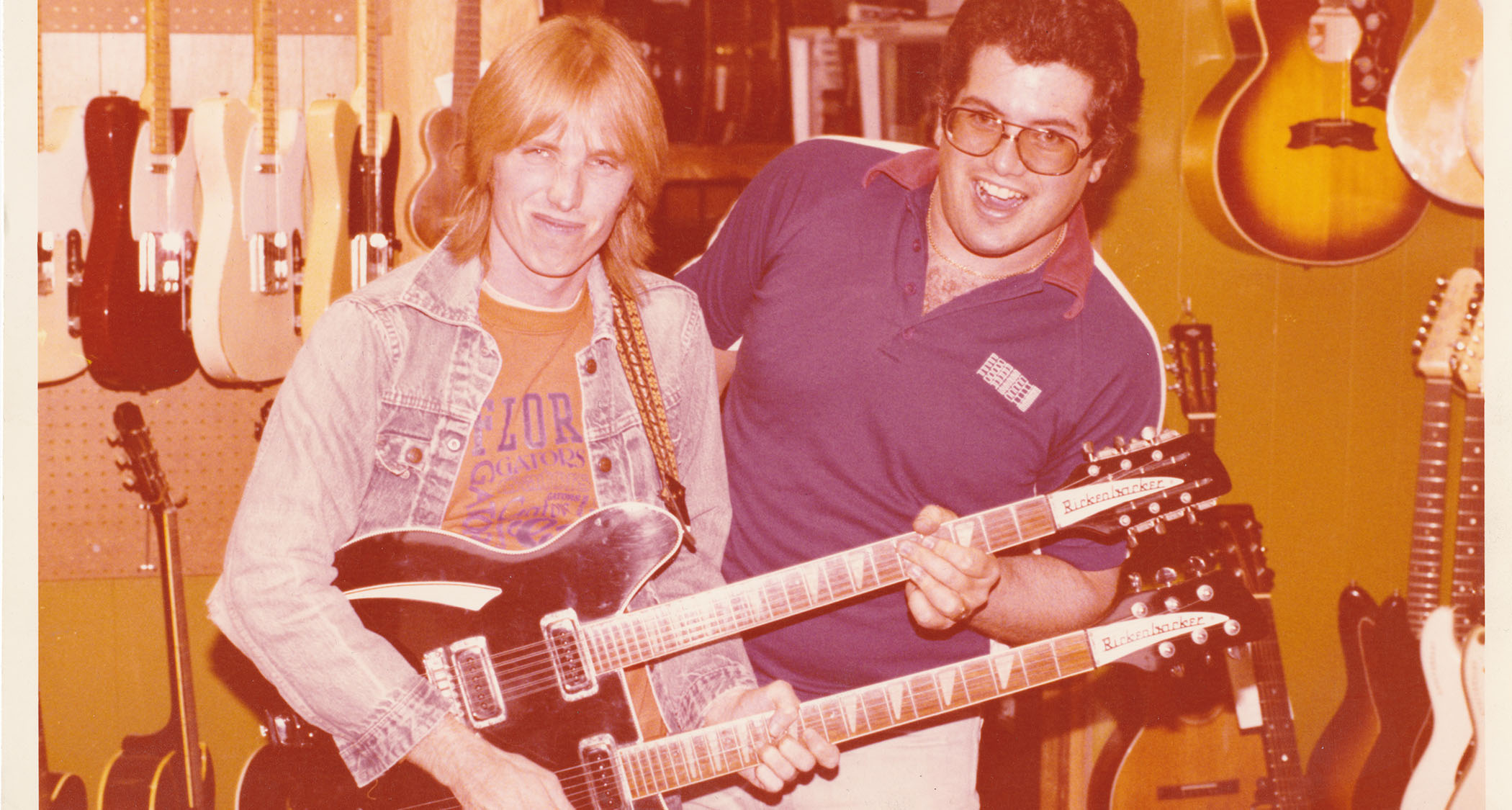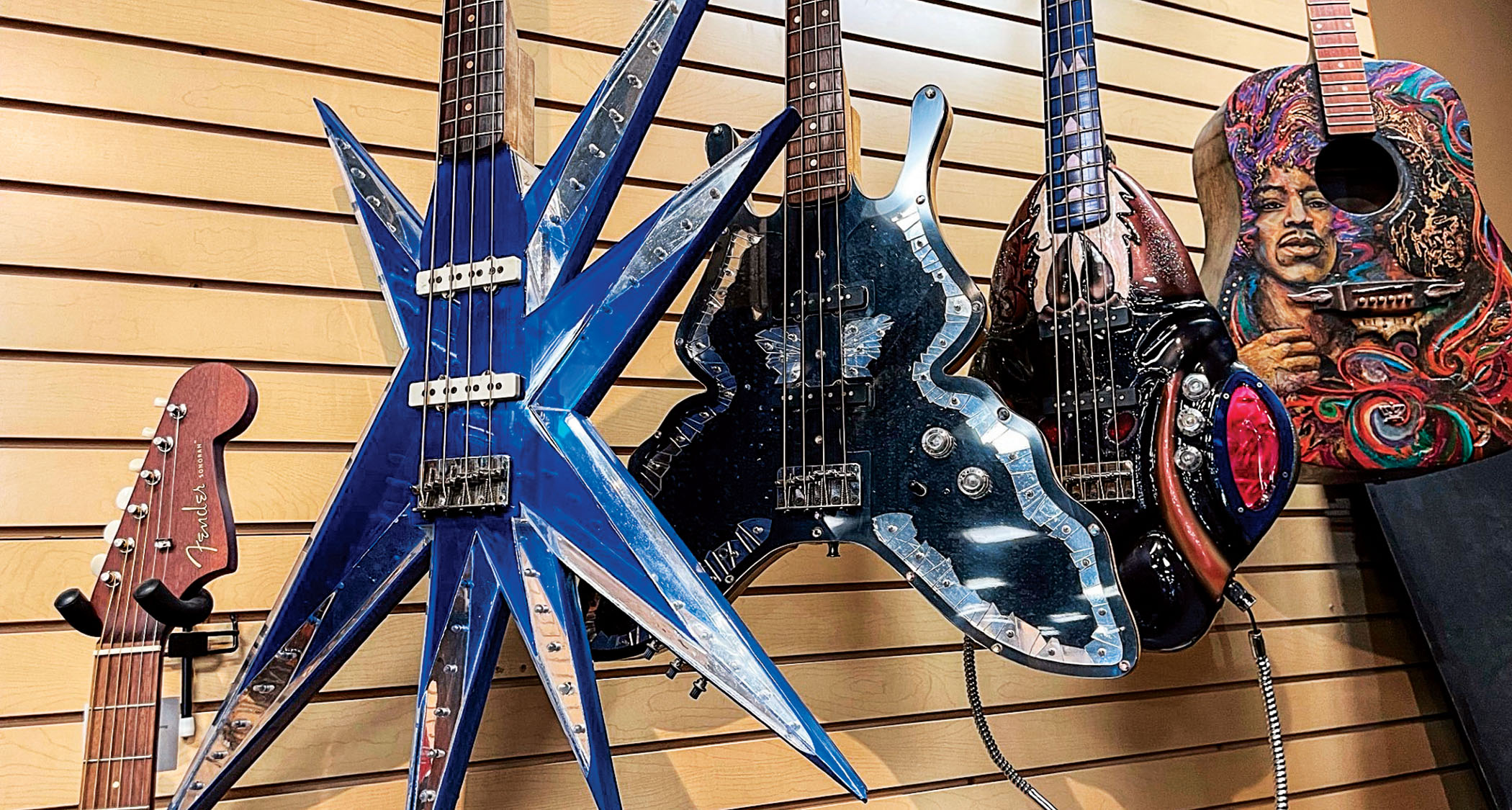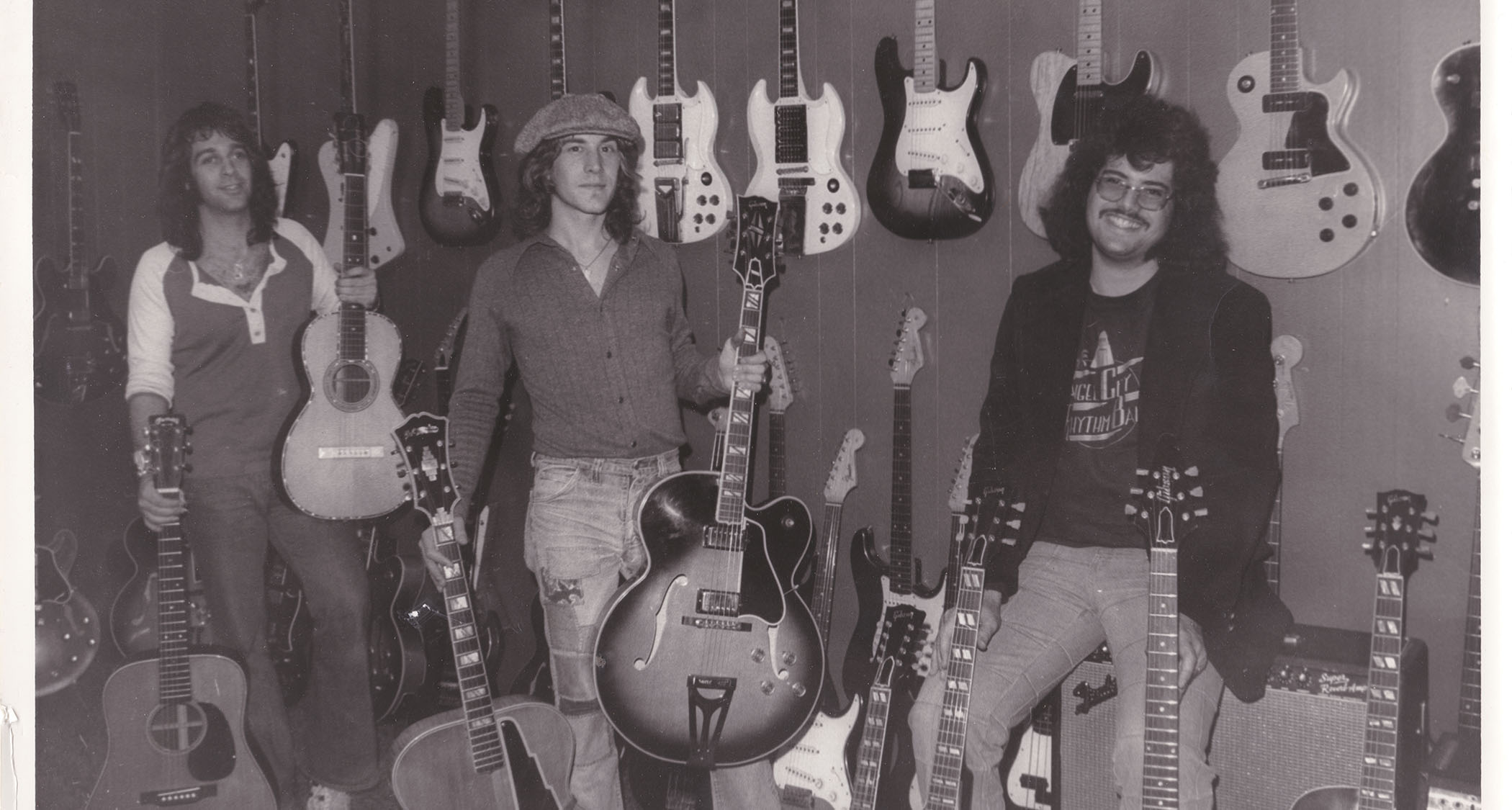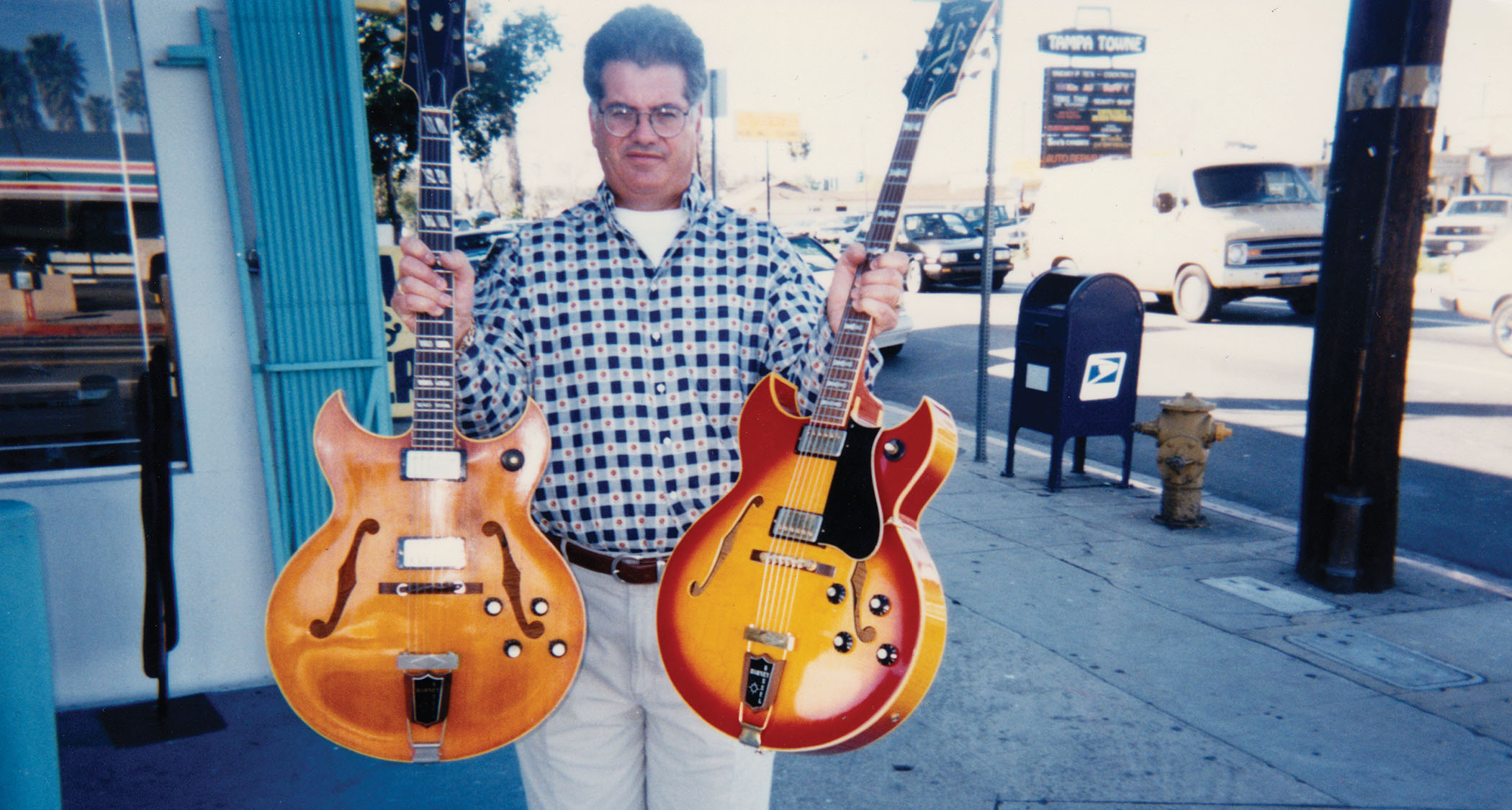“I met Joe when he was 12. He picked up a vintage guitar in one store and they told him to leave. But someone said, ‘This guy called Norm will let you play his stuff’”: The unlikely rise of Norman’s Rare Guitars and the birth of the vintage guitar market
Just in time for a new Netflix doc, GW sits down with Norman Harris – owner of Tarzana, California’s iconic Norman’s Rare Guitars – to discuss 50 years of sales, his kinship with Joe Bonamassa, and what the future holds for the guitar institution

When Norman Harris founded Norman’s Rare Guitars in 1975, he had no idea that his little shop would become an institution in vintage guitars. And that’s mostly because, back in the day, people didn’t really care about the “vintage” concept.
“The word ‘vintage’ wasn’t even used,” Harris tells Guitar World.
At that time, the beloved bursts, Strats and semi-hollows we’ve come to love weren’t even very old; it would be like referring to your 2004 Toyota Camry as “vintage” in, say, 2023. “They were just used guitars,” Harris says.
With the help of Harris, the perception of these instruments began to change. “People think I just made up the prices,” Harris says. “But it was always based on my knowledge and what I and other stores had to pay for guitars. It was always a supply-and-demand thing.”
The supply and demand for vintage guitars has ebbed and flowed into a wild and crazy market where all shapes, sizes and varieties of vintage guitars fetch previously unthinkable prices online, in stores and at auction.
Harris saw a business opportunity in the ’70s but didn’t see any of that coming, though he did know guitars were collectible outliers.

“What I have always called it is ‘functional art,’ ” he says. “Like, a stamp or coin, you can look at it and go, ‘Well, that’s cool,’ and look at it for 10 minutes, put it away, and that’s it. But with a guitar, it makes music. Each one sounds different, plays differently and feels different. I think that’s what gives them pizzazz; it’s the love people have put into them.”
Get The Pick Newsletter
All the latest guitar news, interviews, lessons, reviews, deals and more, direct to your inbox!
Since imprinting himself on the guitar scene in ’75, with the help of guitarist and friend Rick Vito, who penned an article for Guitar Player about the shop’s merit in late ’76, Harris’s store has grown in stature. He’s moved into larger spaces twice, settling into his current location on Ventura Boulevard in Tarzana, California.
Harris, who is or was beloved by customers ranging from musicians like Robbie Robertson, Joe Bonamassa and Richie Sambora, and Kiefer Sutherland to the everyday Tom, Dick and Harry, is well-known in guitar circles. Still, people don’t generally care about guitar nerdery outside of that. And yet, a Netflix documentary outlining his life and exploits, Norman’s Rare Guitars, cropped up in 2024.
Is there a shift in general views toward guitars? Do “regular” people care about guitars more than we think? Or is Norm Harris’s life just that interesting? According to Devin J. Dilmore, the doc’s director – and good friend of Harris’s daughter, Sarah Edwards – the doc’s roots were rather simple.
“Norm’s daughter and I have been friends since junior high,” he says. “She always praised her dad as the coolest guy on the planet with the coolest store.
“As time went on, his store grew and everything was blowing up, and it was always in the back of my mind, ‘God, what a cool story that would be to tell.’ Sure enough, Covid hit, and Norm was like, ‘Okay, you could do maybe a 10-minute documentary.’ I was like, ‘That’s not possible. Your legacy is too large.’ ”
Smiling, Harris says: “By the way… as far as my daughter thinking I’m the coolest guy on the planet? That’s not true. [Laughs] She thinks I’m a big nerd, like every daughter.”

Guitars, guitars, guitars. That’s the name of the game here. Maybe America, overall, is ready to embrace guitars as works of art as they have cars.
Or perhaps, much in the same way that various fetish-driven shows on TV and the internet have, it’s the nerd aspect that Harris mentioned that’s fascinated viewers, enticing non-guitarists to watch a Netflix doc about a guitar-loving guy who sells guitars to the people who play them in a shop that’s devoted to them.
Harris errs toward romanticism when waxing about his life’s work. “There’s something about a guitar,” he says.
“The way you can bend a string and get a vibrato is almost like a human voice. It’s a lot easier to sell something when you really love it. You’re telling someone why it’s really good rather than just throwing a sales pitch at someone you don’t care about.”
To that end, the greatest achievement of Norm Harris, and the documentary about his life and work, isn’t the number of guitars he’s sold.
“It’s how many hearts he’s touched, including mine,” Dilmore says. “Every single person I’ve talked to loves him to death. He’s everybody’s favorite person. That was really comforting to me. I knew I was doing something right.
“It’s about the music, the guitars and, of course, telling [about] a man’s legacy, hard work and giving love to everybody. That’s a really important element and factor – being human.”
Harris is indeed human. In 2022, while filming the documentary, Harris announced he had been diagnosed with a rare form of cancer, appendiceal neoplasms.
For those keeping score, it really is rare, accounting for less than 1 percent of all cancers. But Harris fought through it, bucking the odds, and returned to his post at his shop with no endgame in sight.

“The documentary is a combination,” Harris says. “It’s kind of a love story, a family story and a small-business story. It has a lot of heart.”
“He’s authentic,” Dilmore adds. “He doesn’t beat around the bush. He cares about the people and the guitars they’re going to bring home. People identify with him. Everybody that comes in here loves guitars, so there’s that aspect. But there’s this kind-hearted man who wants to sell you the right guitar for the right job.
“The biggest thing I learned is that the guitar community is connected through music and connecting on a level where you can put everything aside except the love for the guitar. There’s something to be said for that. Norm has touched people’s hearts and makes them smile.”
Norm, the documentary shows you to be a pretty humble guy. What were your initial thoughts about making a full-tilt documentary about your life and career?
“Originally, it was just supposed to be something to show my grandkids [about] what I’d done. My daughter wanted to show the kids what their granddad had done, so I told her, ‘Listen, if we do something, I don’t want you to start calling all my customers and bothering them…’ And she basically did what a lot of daughters do and said, ‘Dad, shut up. I got it from here.’ [Laughs] It just kind of blew up into something.”
Has this doc given you a minute to step back and take in your journey like never before?
“When you’re in the middle of doing stuff, you just do it; you don’t really think about it. But it’s great to be able to look back at it in this context. Seeing the documentary helped me relive a lot of memories.”
Without seeing the documentary, were you wholly aware of you and your shop’s importance in the guitar scene and culture?
“It happened gradually. And every time I think of myself as anything more important, I just say something to my wife, and she tells me to go take out the garbage. [Laughs] She lets me have it. There’s no way I could think anything too good because she kind of chops me down a bit. [Laughs]”
You had a lot of guitarists come out to talk about the shop, but one that stuck out for different reasons was Rick Vito, who wrote about Norman’s in Guitar Player’s December 1976 issue, which features Robbie Robertson on the cover.
“I had a band with Rick for two years in L.A. called the Angel City Rhythm Band. So we’d put a band together, and he was there at the store early on. He knew the whole story, and he said, ‘Maybe [Guitar Player] would be interested in something…’
“He thought it was interesting because this was before people were really considering buying guitars as investments. This was 1976, and that was just starting to come around. At the time, a sunburst Les Paul was like $2,500!”
Was it tough to get Robbie Robertson – who you had supplied guitars for The Last Waltz and, like yourself, was suffering from cancer – to participate?
“We were lucky to get Robbie. He said, ‘Look, I’m not really doing this kind of thing or any other interviews right now, but for you, I’ll do it.’ He was keeping it under his belt; he wasn’t telling a lot of people what was going on with him.
“The people I’ve met are so nice. They really are just regular folks. A lot of people think of them as icons, but they’re just people, and they understand it’s just the way things happen. I was kind of blown away that we didn’t have people going, ‘No, I’m too busy.’”

Also of note is Joe Bonamassa, who isn’t just a guitar collector but seems to be deeply woven into the fabric – and maybe even the future – of the store. How did you two meet?
“I met Joe when he was around 12. He came out to L.A. to do something for a show, and he was just like this wunderkind. He went into a couple of stores in Hollywood, and one store where he picked up a vintage guitar told him to leave.
“But some guy in that store heard him play and said, ‘You might want to go check this guy out in the Valley. This guy called Norm will let you play his stuff.’ That’s when we first bonded.”
You mentioned that when you started, people didn’t see vintage guitars as investments. When did that change?
“I wasn’t the only person doing stuff back in the day. There was George Gruhn in Nashville and Mandolin Brothers in Staten Island, New York, so there were only about three or four stores in the U.S.
“There was no internet, so there were a lot of phone calls between me and other dealers, all going, ‘What are you getting for this? What are you getting for that? What did you pay for that?’ The information slowly seeped out, and then, once the internet came, everyone had access to everything.”
A few shops were doing it, but yours seemed to stand out.
“A lot of times, when you’re doing business, you just keep your head down and do what you do. I don’t think too much about that. It’s hard to think about, but now that I see the documentary, it makes me feel good to know I did something that had some kind of importance to some folks.”

If there wasn’t a great demand for vintage guitars as collector pieces, why did you center your business around them?
“I came out here to be a musician. I realized that when I told somebody I was holding a Gibson, Martin or Fender… when I showed it to somebody, I could say, ‘This thing is really great.’ But when I was trying to promote my music, I knew what I didn’t like about it. It was hard for me to keep a straight face about it. I realized I was better at selling something I really believed in.”
Why did people fall in love with vintage guitars?
“They made some spectacular guitars. It’s one of the things we did in America that is super-iconic and outstanding. I mean… a lot of the cars they built in the late ’60s and ’70s have become trash heaps, but these guitars have stood the test of time. There’s a continuous demand, and they’re very durable and pretty low maintenance if they’re kept well.”
You’re obviously biased, but is there any substitute for a good vintage guitar – and how do you view modern American guitars comparatively?
“They’re now making some of the best guitars they’ve made in 50 or 60 years. But there’s a reason a lot of stuff is reissued: they really nailed it the first time out. Companies realized they were selling guitars for $2,000 and that people were paying more than $5,000 for the old ones.
“A light bulb went off, and the companies realized they must have been doing something good and thought, ‘What can we do to kind of compete with ourselves?’”

Regardless of whether Norm’s helped fuel the vintage guitar boom, the shop’s rise coincided with the rise in interest in vintage guitars. Does that even matter, meaning, would you have had success in that era?
“I think it was the perfect time. The prices of instruments were way down, and they were affordable. There wasn’t as much information out there, so I supplied a lot of information to a lot of books about vintage guitars. Back then, the only way you could find something out was by asking questions, seeing original guitars and using them as a template.
“I played, felt and heard enough old guitars that I got used to what they were compared to new guitars, so people writing books called me for information, and I gave it. So would George Gruhn. That’s how all the stuff that you now see on the internet came about.”
To that end, the documentary is important because it shines a light on the value of guitar shops in American culture.
The one thing about my store, which is very interesting, is that in my business, with old guitars, if I don’t sell through my merchandise, it’s a good thing
“Small businesses, in general, have a lot of problems, trials and tribulations that you have to deal with. Even though it’s guitar, it could apply to a lot of other businesses in other fields, too.
“The one thing about my store, which is very interesting, is that in my business, with old guitars, if I don’t sell through my merchandise, it’s a good thing.”
Is that because of the perpetual increase in the value of vintage guitars?
“Yes. A lot of times, if this stuff doesn’t sell – and some of it I’ve had for years – it’s worth that much more, you know? With clothing, by the end of the season, you want to get rid of everything you have so you’re not stuck with last year’s model.
“But with antique and collectible guitars, the blessing of the business is that it’s the opposite. Fortunately, I had a good eye for clean, original stuff, and I stashed a lot of things away that I thought I’d never see again.”

Obviously, the shop is how you’ve made money, but it’s also become a legacy. What do guitars mean to you now?
“I love my product. But if I were selling plumbing supplies, it would probably be a different feeling. [Laughs] With guitars, each one of them provides a sound and playability for all different reasons, you know?
“We have guitars in all different price ranges for a lot of people, so it’s an opportunity for somebody to get something that can get the music they hear in their heads out. They can make music with these things and write and create songs.”
It must make you feel good to know that guitars you’ve sold are played on stages across the world and have been featured on songs we hear on the radio. You’ve helped give a second life to a lot of vintage instruments.
“I don’t know how many hit songs were written on guitars I’ve sold… but that makes me feel really good that I did something that provided music and joy for a lot of people. They came from somewhere, and a lot of times, these guitars are the inspiration that got people to write these songs. Man, I love what my product is.”
At the end of the doc, it was clear that while you’re getting older, there’s no exit strategy for you when it comes to the shop. Has that changed?
“I think about it all the time. I would love for somebody to take it over who loves it as much as I do, keep my employees and try to run it in the same fashion that I tried to. It’s grown to become much bigger than it was; it’s really hard for me to think about.”
So, you don’t want to stop, even though you know you’ll eventually have to.
We’ve talked a little bit, but Joe has such a big career going right now that there’s nothing that should interrupt his career
“I’d like to do it until I can’t do it, which is probably getting pretty near. I’ve had health scares, and I’m lucky I’m here at all right now. But like anybody who wants to be in the business they love, you get up in the morning, go to work and don’t dread it. If you hate what you do, you go, ‘Oh, no, I have to go do this,’ but I’m still excited to go in, even at my age.”
Circling back to Joe Bonamassa, the insinuation was that he might be that person who could take over Norm’s and run it as you do. Have you discussed that with Joe?
“We’ve talked a little bit, but Joe has such a big career going right now that there’s nothing that should interrupt his career. If he wasn’t doing what he’s doing, he’d be a natural fit. He loves guitars, can play great and demo them great. He lives to promote young talent like I do.
“We’ve had a lot of young, undiscovered players and journeymen who really need more exposure, and because of our platform, we can expose a lot of these people to the public. Joe feels the same way about it.”
- Norman's Rare Guitars Documentary is streaming now on Netflix.
- This article first appeared in Guitar World. Subscribe and save.
Andrew Daly is an iced-coffee-addicted, oddball Telecaster-playing, alfredo pasta-loving journalist from Long Island, NY, who, in addition to being a contributing writer for Guitar World, scribes for Bass Player, Guitar Player, Guitarist, and MusicRadar. Andrew has interviewed favorites like Ace Frehley, Johnny Marr, Vito Bratta, Bruce Kulick, Joe Perry, Brad Whitford, Tom Morello, Rich Robinson, and Paul Stanley, while his all-time favorite (rhythm player), Keith Richards, continues to elude him.
You must confirm your public display name before commenting
Please logout and then login again, you will then be prompted to enter your display name.







